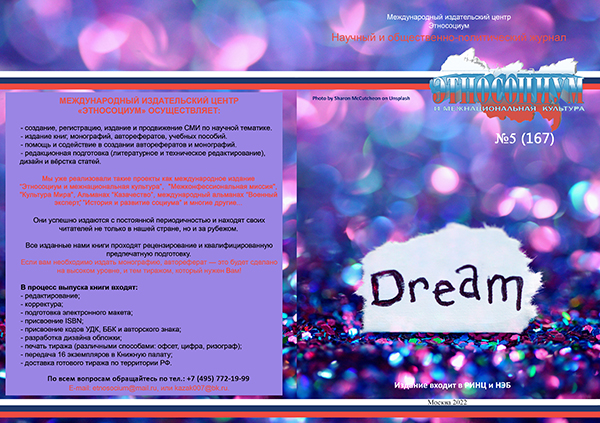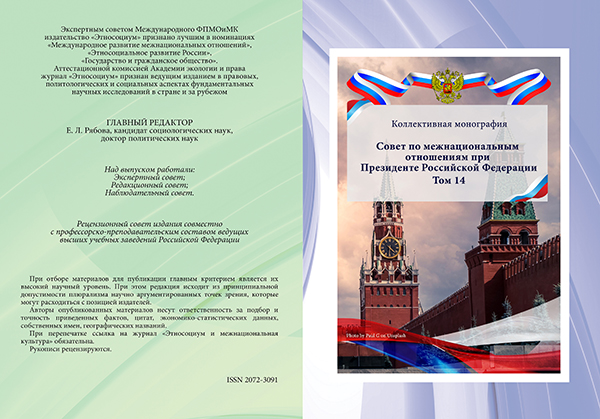

Content
|
COUNCIL OF INTERNATIONAL RELATIONSHIP. DISCUSSION FORUM
|
|
|
Biryukov S.V., Moroz E.V., Mazhinskiy S.V. Color revolutions and the crisis of modern society (in the Post-Soviet space)
|
9
|
|
Vinokurov N.V. Youth as a subject of political activity in Russia in the context of modern transformations
|
20
|
|
Dolgenko A.N., Kosyreva M.S. The main factors of orthographic destabilization
|
30
|
|
ACTUAL PROBLEMS OF MODERN SOCIETY
|
|
|
Gryaznov S.G. Professional development of military conductors (based on creative meetings with People's Artist of the USSR V.I. Fedoseev)
|
36
|
|
INTERNATIONAL RELATIONSHIPS
|
|
|
Sidorenko N.V. The Russian language as a link between the states of Central Asia and the Russian Federation
|
43
|
|
ROUND TABLE
|
|
|
International round table on the theme "Foreign policy of Russia in the context of the aggravation of the international situation
|
52
|
|
REVIEW
|
|
|
Cheremnykh L.G., Dotsenko M.Yu., Turova E.I. Modern interpretation of the problem of the relationship between soul and body
|
57
|
|
POST RELEASE
|
|
|
The results of the audience award of the exhibition project "From Creativity to Friendship" were summed up
|
63
|
|
Abstracts
|
66
|
|
Authors
|
73
|
|
Requirements to materials submitted to the international publishing house "Etnosocium"
|
75
|
The article analyzes the social nature and real functionality of the "color revolutions" in the post-Soviet space, which radically changed the situation in this region. The authors consider "color revolutions" as a manifestation of a larger phenomenon - "postmodern revolutions" that have become a challenge for the "Modern society". The article reveals the thesis that the "color revolutions" are caused by the crisis of the post-Soviet and post-communist statehood, generated by the rejection of modernization in the interests of the majority of society (the modernization of the elite was carried out instead of the modernization of the country itself). In the course of studying the specific manifestations of the post-Soviet "color revolutions", the main characteristic feature is formulated - the desire for social revenge of all those who were deprived as a result of post-socialist transformations.
The article emphasizes that the “color revolutions” became the destruction of the foundations of the Modern society in the post-Soviet countries, being a kind of “leap-like” transition from the Modern society (in crisis) to the postmodern reality, with the help of a new type of revolution aimed primarily at changing public consciousness and way of life.
Possible ways of the near future of the post-Soviet states in the context of the phenomenon of "color revolutions" are proposed and considered.
Keywords: color revolutions, modern, society, state, post-Soviet.
The analysis of psychological determinants and types of political activity of modern youth in Russia is carried out. It is proved that political behavior is a complex and multifaceted phenomenon in the conditions of modern transformations. The significant practical significance of this phenomenon in the modern conditions of public life is argued, because it allows predicting the vectors of development of the political behavior of citizens, to a certain extent influence it and direct these vectors in the direction desired for political institutions and the social system in general.
Keywords: political activity, political behavior, conventionality, legal normativity, social involvement.
The article is divorced to the analysis of the main factors of orthographic destabilization in the modern Russian language. It is a systematic violation of the orthographic norm, mistakenly presented as following the norm. Spelling destabilization in the modern Russian language occurs due to the impact of internal and external factors. The internal one consists in the legitimization and replication of non-standard spelling variants. External is due to the specific mechanisms of phonetic and graphic adaptation of borrowings in Russian: the adaptation of new words from global English is carried out in different ways and with violations of the existing orthographic rules. The authors demonstrate the orthographic destabilization through representative examples and come to the conclusion that it has a destructive nature and must be overcome.
Keywords: modern Russian language, orthography, language culture.
The article emphasizes the importance of using practice-oriented forms of training sessions in the process of developing the professional competencies of future conductors of military orchestras, and analyzes the features of the rehearsal process of outstanding conductors of our time.
Particular attention is paid to the use in the educational process of master classes of outstanding masters of domestic conducting performing arts, which contain not only a colossal professional component, but also play a significant educational role, contributing to the formation of a civil position, patriotism and responsibility for the quality of professional activity among future conductors.
Meetings with maestro V.I. Fedoseev help future military conductors to feel the national character of the music they perform, to penetrate into the depths of the composer's intention and learn to highlight the characteristic features of the composer's style, to be patriots of Russia.
Keywords: military conductor, rehearsal with a military orchestra, conductor's gesture, musical taste, master class, educational process, professional competencies.
This article examines the status of the Russian language in the countries of Central Asia (CA) and the steps taken by the states of CA and RF to strengthen interstate and intercultural relations. It also analyzes the measures taken by local authorities either to maintain the Russian language or to reject it. The distinctive features of the role and place of the Russian language in the five former Soviet republics are presented.
Keywords: Russian language, Central Asian states, language status, law, derussification, language patrols, toponymic landscape.
The Department of International Security and Foreign Policy of Russia of the FNB IPNB together with the International Publishing House "Ethnosocium" held an international round table on the topic "Foreign policy of Russia in the context of an aggravated international situation".
The reports and their discussion allowed the participants to more clearly understand the causes of the aggravation of the situation in the world, as well as to determine the most important aspects of Russia's foreign policy in these new geopolitical conditions.
Keywords: conditions, realities, situation, foreign policy, Russia, changes.
The review of the monograph examines the proposed theory of psychosomatics. The psychosomatic problem was posed by mankind in ancient times as the problem of the relationship between the soul and the body. Even then, people began to notice the connection between the psyche and the body, talking about the influence of the soul on the body and the body on the soul. The question of the relationship between the spiritual and the corporeal runs like a red thread through the entire history of culture, occupying an important place in people's thoughts and affecting their philosophical, scientific, moral, artistic and religious quests.
Keywords: modernity, interpretation, interpretation, relationship, soul, psychosomatics.